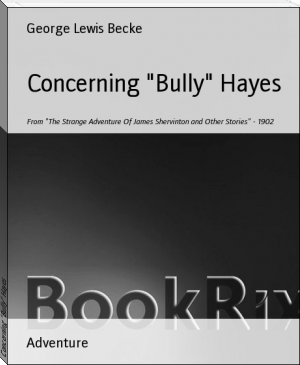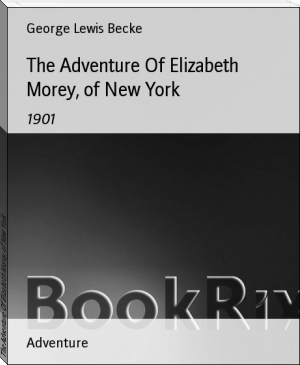Ridan The Devil And Other Stories - George Lewis Becke (free ebooks for android txt) 📗

- Author: George Lewis Becke
Book online «Ridan The Devil And Other Stories - George Lewis Becke (free ebooks for android txt) 📗». Author George Lewis Becke
MR HORATIO BILGER
Journalist and Litterateur
Formerly Editor of the 'Barangoora News'
Real Aylesbury Ducks for Sale
Book-keeping Taught in Four Lessons
4a Kellet Street,
Darlinghurst, Sydney
I said I should bear him in mind, and, after helping him to release his umbrella, saw him down the steps and watched him disappear.
'Thank Heaven!' I said to Kate, 'we have seen the last of him.'
I was bitterly mistaken, for next morning when I entered the office, Bilger was there awaiting me, outside the sub-editor's room. He was wearing a new pair of boots, much larger than the old ones, and smiled pleasantly at me, and said he had brought his son Edward to see me, feeling sure that I would use my influence with the editor and manager to get him put on as a canvasser.
I refused point blank to see 'Edward' then or at any other time, and said that even if there was a vacancy I should not recommend a stranger. He sighed, and said that I should like Edward, once I knew him. He was 'a noble lad, but misfortune had dogged his footsteps--a brave, heroic nature, fighting hard against unmerited adversity.' I went in and shut the door.
* * * * *
Two days later Kate asked me at supper if I _couldn't do something for old Bilger's son_.
'Has that infernal old nuisance been writing to you about his confounded son?'
'How ill-tempered you are! The "old nuisance," as you call him, has behaved very nicely. He sent his son over here to thank us for our kindness, and to ask me to accept a dozen extra cards from himself. The son is a very respectable-looking man, but rather shabby. He is coming again to-morrow to help Mary to put up the new wire clothes line.'
'Is he? Well, then, Mary can pay him.'
'Don't be so horrid. He doesn't want payment for it. But, of course, I shall pay his fare each way. Mary says he's such a willing young man.'
In the morning I saw Mr Edward Bilger, helping Mary. He was a fat-faced, greasy-looking youth, with an attempted air of hang-dog respectability, and with 'loafer' writ large on his forehead. I stepped over to him and said,--
'Now, look here. I don't want you fooling about the premises. Here's two shillings for you. Clear out, and if you come back again on any pretence whatever I'll give you in charge.'
He accepted the two shillings with thanks, said that he meant no offence, but he thought Mary was not strong enough to put up a wire clothes line.
Mary (who was standing by, looking very sulky) was a cow-like creature of eleven stone, and I laughed. She at once sniffed and marched away. Mr Bilger, junior, presently followed her into the kitchen. I went after him and ordered him out. Mary was leaning against the dresser, biting her nails and looking at me viciously.
Half an hour later, as I walked to the ferry, I saw Mr Bilger, junior, sitting by the roadside, eating bread and meat (my property). He stood up as I passed, and said politely that it looked like rain. I requested him to make a visit to Sheol, and passed on.
In the afternoon my sister called upon me at the _Evening News_ office. She wore that look of resigned martyrdom peculiar to women who have something unpleasant to say.
'Mary has given me notice--of course.'
'Why "of course!"'
Kate rose with an air of outraged dignity. 'Servants don't like to be bullied and sworn at--not white servants, anyway. You can't expect the girl to stay. She's a very good girl, and I'm sure that that young man Bilger was doing no harm. As it is, you have placed me in a most unpleasant position; I had told him that he could let his younger brothers and sisters come and weed the paddock, and--'
'Why not invite the whole Bilger family to come and live on the premises?' I began, when Kate interrupted me by saying that if I was going to be violent she would leave me. Then she sailed out with an injured expression of countenance.
When I returned home to dinner at 7.30, Mary waited upon us in sullen silence. After dinner I called her in, gave her a week's wages in lieu of notice, and told her to get out of the house as a nuisance. Kate went outside and wept.
* * * * *
From that day the Bilger family proved a curse to me. Old Bilger wrote me a note expressing his sorrow that his son--quite innocently--had given me offence; also he regretted to hear that my servant had left me. Mrs Bilger, he added, was quite grieved, and would do her best to send some 'likely girls' over. 'If none of them suited, Mrs Bilger would be delighted to come and assist my sister in the mornings. She was an excellent, worthy woman.' And he ventured, with all due respect, to suggest to me that my sister looked very delicate. His poor lad Edward was very sad at heart _over the turn matters had taken_. The younger children, too, were sadly grieved--to be in a garden, even to toil, would be a revelation to them.
That evening I went home in a bad temper. Kate, instead of meeting me as usual at the gate, was cooking dinner, looking hot and resigned, I dined alone, Kate saying coldly that she did not care about eating anything. The only other remark she made that evening was that 'Mary had cried very bitterly when she left.'
I said, 'The useless, fat beast!'
* * * * *
The Curse of Bilger rested upon me for quite three months. He called twice a week, regularly, and borrowed two shillings 'until next Monday.' Then one day that greasy ruffian, Bilger, junior, came into the _Evening News_ office, full of tears and colonial beer, and said that his poor father was dead, and that his mother thought I might perhaps lend her a pound to help bury him.
The sub-editor (who was overjoyed at Bilger's demise) lent me ten shillings, which I gave to Edward, and told him I was sorry to hear the old man was dead. I am afraid my face belied my words.
THE VISION OF MILLI THE SLAVE
One day a message came over from Tetoro, King of Pare, in Tahiti, to his vassal Mahua, chief of Tetuaroa,{*} saying, 'Get thee ready a great feast, for in ten days I send thee my daughter Laea to be wife to thy son Narue.
* Tetuaroa is an island about forty miles from Tahiti. It
was in those days (1808) part of the hereditary possessions
of the chief of Pare.
For Narue, the son of the chief of Tetuaroa, had long been smitten with the beauty of Laea, and desired to make her his wife. Only once had he seen her; but since then he had sent over many canoes laden with presents, such as hogs and turtle, and great bunches of plantains, and fine tappa cloth for her acceptance.
But Tetoro, her father, was a greedy man, and cried for more; and Mahua, so that his son might gain his heart's desire, became hard and cruel to the people of Tetuaroa.
Day after day he sent his servants to every village on the island demanding from them all such things as would please the eye of Tetoro; so that by-and-by there was but little left in their plantations, and still less in their houses.
And so, with sullen faces and low murmurs of anger, the people yielded up their treasures of mats and tappa cloth, and such other things that the servants of the chief discovered in their dwellings, and watched them carried away to appease the avarice of Tetoro the King.
One night, when they were gathered together in their houses, and the torches of _tui tui_ (candle-nut kernels) were lighted, they talked among themselves, not loudly but in whispers, for no one knew but that one of the chiefs body-men might perhaps be listening outside, and that to them meant swift death from the anger of Mahua.
'Why has this misfortune come upon us?' they said to one another. 'Why should Narue, who is an _aito_{*} set his heart upon the daughter of Tetoro when there are women of as good blood as her close to his hand? Surely, when she comes here to live, then will there be hard times in the land, and we shall be eaten up with hunger.'
* A man distinguished in warfare.
'Ay,' said a girl named Milli, 'it is hard that we should give our all to a strange woman.'
She spoke very loudly, and without fear, and the rest of the people looked wonderingly at her, for she was but a poor slave, and, as such, should not have raised her voice when men were present. So they angrily bade her be silent. Who was she that dared to speak of such things? If she died of hunger, they said, what did it matter? She was but a girl and a slave, and girls' lives were worth nothing until they bore male children.
And then Milli the Slave sprang up, her eyes blazing with anger, and heaped scorn upon them for cowards.
'See,' she said, and her voice shook with passion; 'see me, Milli the Slave, standing before ye all, and listen to my words, so that your hearts may grow strong, even as strong as mine has grown. Listen while I tell thee of a dream that came to me in the night.
'In my dream this land of ours became as it was fifteen moons ago, and as it may never be again. I saw the groves of plantains, with their loads of fruit, shine red and yellow, like the setting of the sun, and the ground was forced open because of the great size of the yams and taro and arrowroot that grew beneath; and I heard the heavy fall of the ripe coconuts on the grass, and the crooning notes of the pigeons that fed upon the





Comments (0)